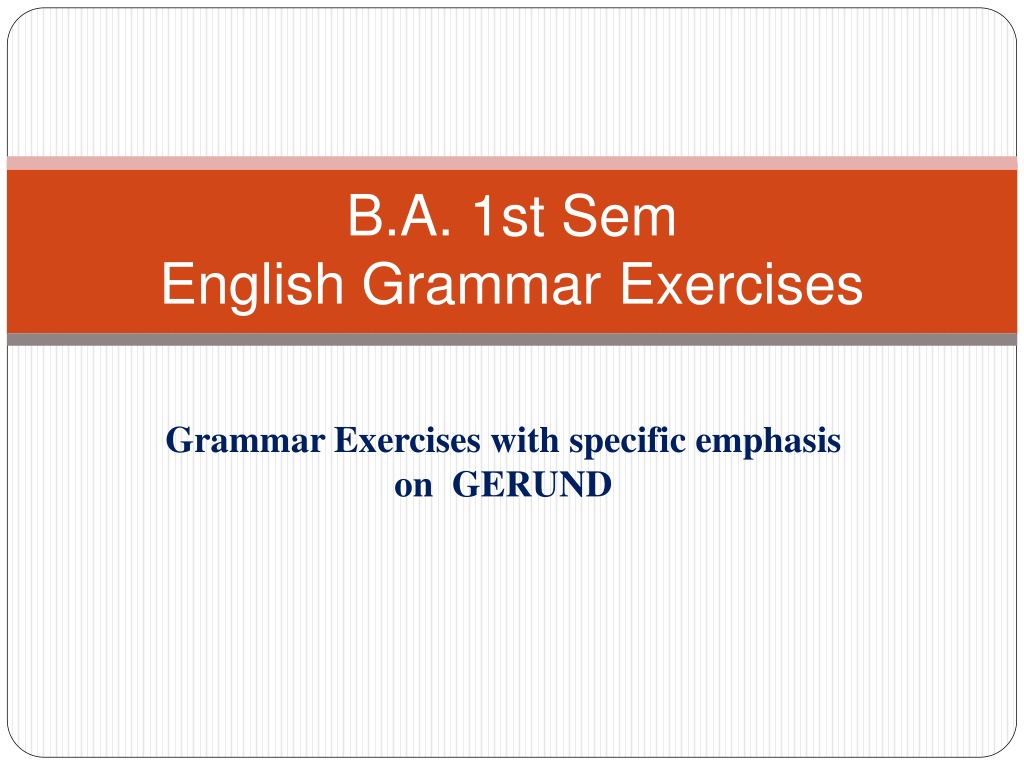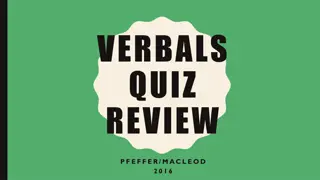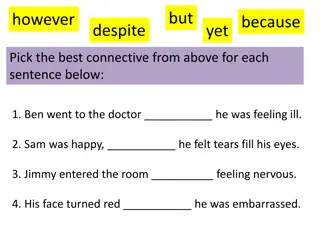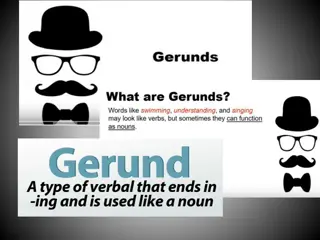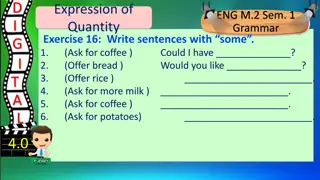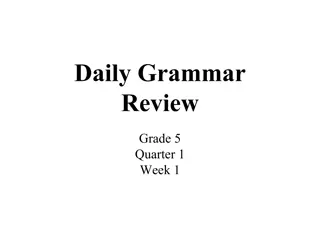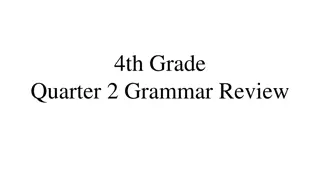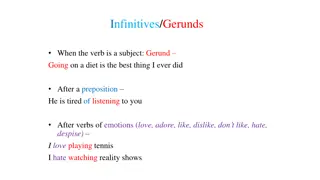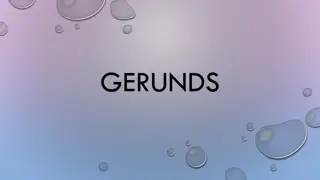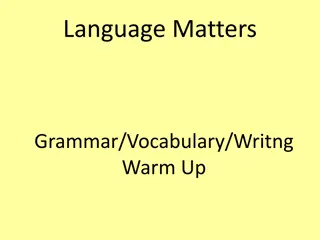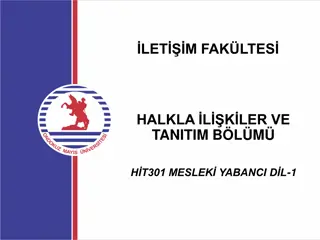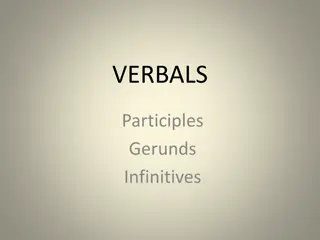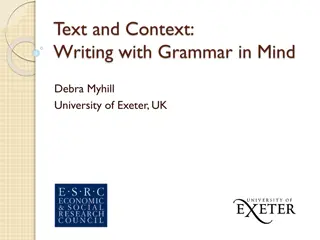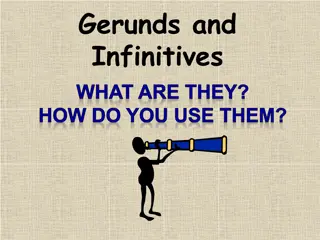Understanding Gerunds: Grammar Exercises with Emphasis on Gerunds
This content provides exercises and explanations on using gerunds in English grammar. It covers the definition of gerunds, verbs that can be followed by gerunds, and examples showing the use of gerunds after different expressions and verbs. The exercises require supplying gerund forms of verbs and offer answers for practice. Readers can enhance their understanding of gerunds and their application in sentences through this comprehensive resource.
Download Presentation

Please find below an Image/Link to download the presentation.
The content on the website is provided AS IS for your information and personal use only. It may not be sold, licensed, or shared on other websites without obtaining consent from the author. Download presentation by click this link. If you encounter any issues during the download, it is possible that the publisher has removed the file from their server.
E N D
Presentation Transcript
B.A. 1st Sem English Grammar Exercises Grammar Exercises with specific emphasis on GERUND
GERUND A gerund is form of verb that functions as a noun and ends in ing. Certain verbs, like enjoy, mind, stop, consider, appreciate, and finish, can be followed by gerunds but not infinitives. 1. He enjoys studying English. 2. I finished reading the lesson. 3. He has stopped trying to be first.
Continued B. Gerunds may also be used after most prepositions but not after to when it is part of an infinitive. 1. Jane is fond of exercising. 2. We use this pot for brewing tea. C. Gerunds are used after the expressions to be worth, no use, and do you mind.
Continued 1. The new Lucas film is worth seeing. 2. It s no use trying to call them at this hour. 3. Do you mind riding for an hour to work. D. Certain verbs can be followed by either gerunds or infinitives. Some of these verbs are start, begin, continue, like, hate, cease, love, prefer and intend.
Continued 1. He has begun to take English lessons. 2. He has begun taking English lessons. 3. She will continue to study in that class. 4. She will continue studying in that class.
Exercises on Gerund A. In the sentences below, Supply the gerund form of the verb shown in parentheses. Answers: 1. I am considering back to Montreal. (move) 2. I enjoy with Miss Kinsey. (study) 3. Mr. Perez stopped to his English class. (go) 4. Do you mind a few minutes in the hall. (wait) 1. I am considering moving back to Montreal. 2. I enjoy studying with Miss kinsey. 3. Mr. perez stopped going to his English class. 4. Do you mind waiting a few minutes in the hall?
Continued Continued 5. We are considering a cassette recorder. (buy) 6. Did you enjoy through Canada last summer? (travel) 7. Ask that gentleman whether he minds back this afternoon. (come) 8. Mr lamb enjoys to the radio. (listen) Continued 5. We are considering buying a cassette recorder. 6. Did you enjoy travelling through Canada last summer. 7. Ask that gentleman whether he minds coming back this afternoon. 8. Mr lamb enjoys listening to the radio.
Continued B.Supply the gerund of the verb in parentheses. Where necessary, introduce a preposition. Answers: 1. Were you successful Ms Vaughn? (see) 2. Is Kay fond ?(swim) 3. He needs much more drill .(spell) 1. Were you successful in seeing Ms. Vaughn? 2. Is kay fond of swimming? 3. He needs much more drill in spelling.
Continued Continued Continued 4. There s no use calling Mr. Dennis. He s not at home now. 5. There is little chance of seeing him today. 4. There s no use Mr. Dennis. He s not at home now. (call) 5. There is little chance him today. (see) 6. That salesman has left. He got tired for Ms. Moreno. (wait) 6.That salesman has left. He got tired of waiting for Ms. Moreno.
Continued Continued Continued 7. That book is well worth . (read) 7. That book is well worth reading. 8. Do you mind living in the city? 8. Do you mind in the city? (live)
Gerund Continued C. Complete each of the following sentences with a gerund. Answers: 1. Mickey intends biology this semester. (take) 2. He likes lessons from Miss Dixson. (take) 3. I hated Mr. Hall about that report. (tell) 1. Mickey intends taking biology this semester. 2. He likes taking lessons from Miss Dixson. 3. I hated telling Mr. Hall about that report.
Continued Continued 4.They prefer at five o clock instead of at six. (meet) 5. Joe will start in that department next week. (work) 6. But he will continue frequent trips to the Midwest. (take) Continued 4. They prefer meeting at five o clock instead of at six. 5. Joe will start working in that department next week. 6. But he will continue taking frequent trips to the Midwest.
Continue Continue Continue 7. Meg loves working for Mr. Harris 7. Meg loves for Mr. Harris. (work) 8. He intends leaving on the fifteenth. 8. He intends on the fifteenth. (leaving)
Gerund Continued D. Using a gerund construction, complete the following sentences in your own words. 1. We finally succeeded in . Answers: 1. We finally succeeded in reaching the destination. (Passing the exam.) 2. They are thinking of providing more facilities to the local students. 3. They are both very fond of swimming. (cooking) 2. They are thinking of . 3. They are both very fond of .
Continue Continue Continue 4. In the middle of our discussion, the man suddenly burst out weeping. (crying, laughing) 4. In the middle of our discussion, the man suddenly burst out . 5. Have you finished reading. (writing) 5.Have you finished . 6. Mrs. Belkam has suggested . 6. Mrs Belkam has suggested reading for thirty minutes daily.
Continue Continue Continue 7. If we don t hurry, we ll miss . 7. If we don t hurry, we ll miss listening lecture. 8.The Cresseys had to postpone releasing the book 8. The Cresseys had to postpone .
